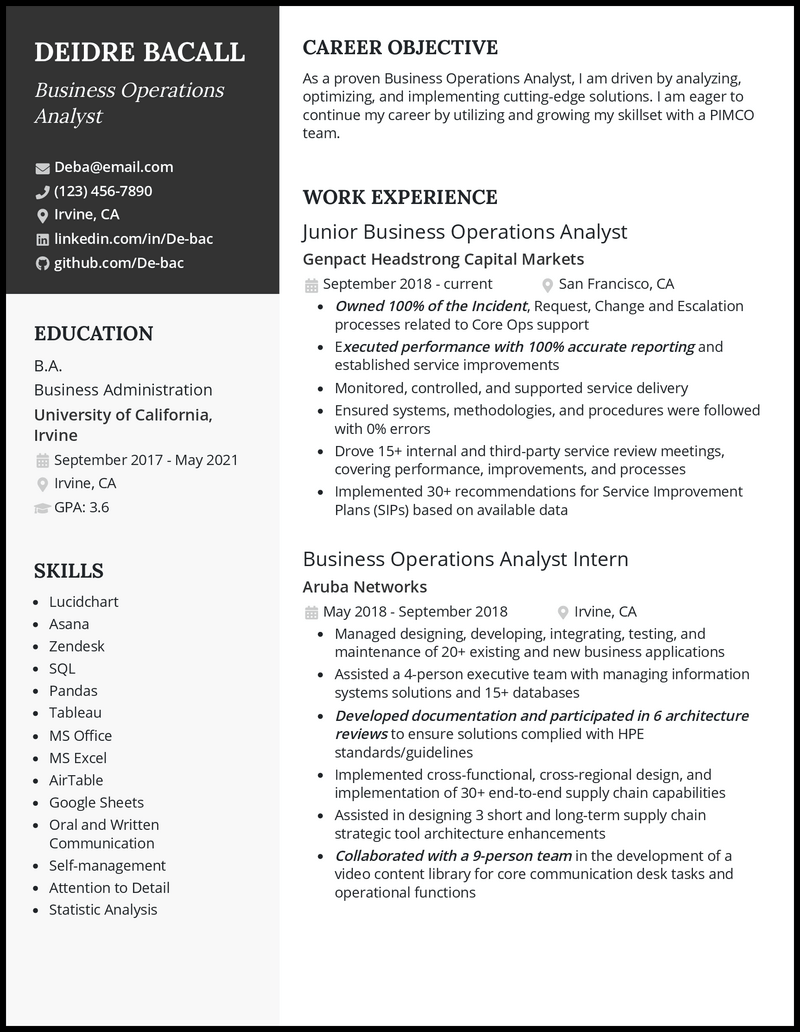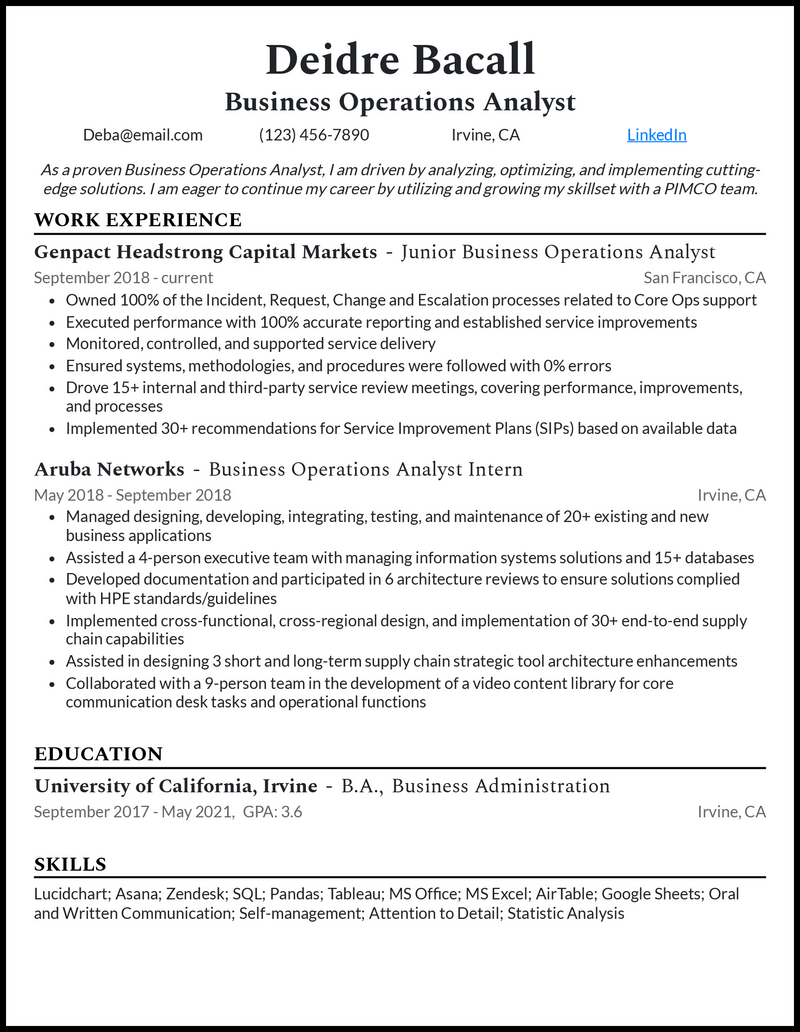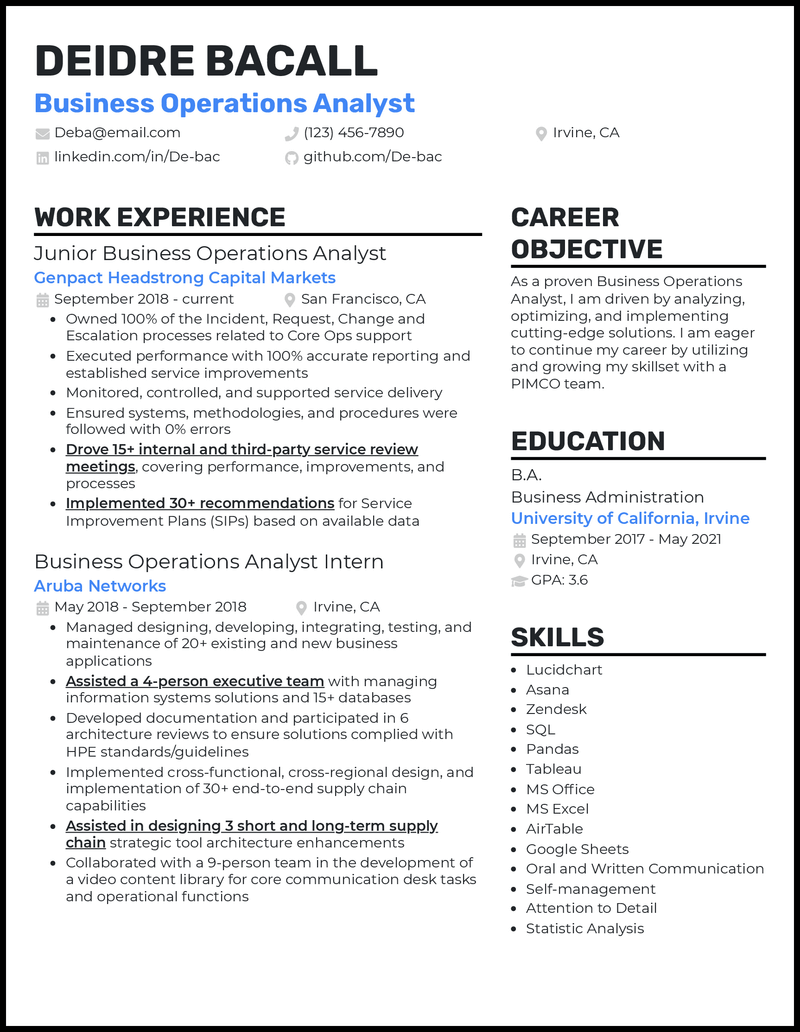Let your operations analyst resume present your technical expertise, analytical skills, and career potential in a way that convinces hiring managers you’re the dream candidate.
This guide will show you how to write a resume that works, emphasize the value of creating a cover letter, and use proven resume templates to land more interviews.
Be ready for:
- ↪ Three time-tested operations analyst resume samples that actually win attention
- ↪ How to make sure you don’t leave out anything important in your application
- ↪ Practical tips to help you land an excellent operations analyst job
Why this resume works
- Fan of being tech-savvy? List down all the tools you’re a pro at. Remember to vary these tools as much as possible.
- Don’t include the same type of software together. Have Asana for project management? Feel free to skip similar tools like ClickUp. Overall, keep things diverse throughout and let your operation analyst resume reflect your enthusiasm for your using tech to drive business results.
How to Write an Operations Analyst Resume

Writing the perfect operations analyst resume should focus on demonstrating your technical strengths in a way that highlights problem-solving, delivering efficiency, and measurable results.
Summary
When writing an operations analyst resume, clearly connect your analytical skills and real project outcomes to the value you can deliver for the potential employer.
In this section, we’ll share strategies you can use to confidently present your qualifications and experience, like these job-winning resume examples.
Things we’ll cover:
- Core skills every operations analyst should have
- How to frame your experience as a winner
- The role of project-based education in strengthening your profile
- Formatting advice to keep your resume clear and compelling

Understand what operations analysts do
A convincing operations analyst resume must understand that the role revolves around gathering data, interpreting it, and delivering insights that improve business efficiency—core results you’ll need to highlight in your resume.
Operations analysts:
- Evaluate processes
- Track metrics
- Suggest solutions that cut costs, save time, or improve service delivery

Core components of an operations analyst resume
Built your resume with these essentials:
- Professional header
- Tailored summary
- Detailed work experience with the backing of measurable contributions
- Core skills
- Education and niche certifications

Put everything in a simple, clear format
When it comes to the resume format, go with clarity over complexity because hiring managers and applicant tracking systems (ATS) both need to quickly parse your content.
Be consistent and label each section clearly, use white space wisely, and if needed, check your layout with a resume parser to ensure it reads correctly.

Craft a compelling header, including contact info
Instantly catch the eye of the recruiter with a polished and accessible header at a glance. Without an error, concisely list:
- Role’s title
- Your full name
- Professional email
- Active phone number
- LinkedIn profile
- Location (city and state)

Share a snapshot of your strengths in a summary
In 2-3 lines, pitch your value in a candid and compelling statement that directly underscores your skills, industry knowledge, and career goals for the role.
If you’re stuck, use a resume summary generator for inspiration, but always personalize the final version to reflect your unique profile and match your LinkedIn “about” section.

Put your operations analyst skills to work
Your whole “thing” is conducting in-depth analysis of success indicators for the business you work for, and then applying those learnings: “How well are the current operations performing, and how can I improve the strategy?” Recruiters want to see that you have the niche skills required to make this happen.
General abilities like “communication” and “computer skills” should be a given for a pro like you, and nothing that vague should go on your resume skills section! It’s time to get specific.
Go beyond interpersonal skills to clarify how you apply them within your role. List programs, strategic elements, and software tools by name.
Here’s what we mean:
9 Best Operations Analyst Skills
- Lucidchart
- Asana
- Zendesk
- Tableau
- Google Sheets
- AirTable
- Time Management
- Statistical Analysis
- SQL

Present the best performances from your work history
Those skills make an excellent introduction, but recruiters want to dive into the next chapter of your story: How do you utilize those skills to their fullest potential? How have you applied your analytical, detail-oriented mindset on the job to exceed expectations?
You can get some inspiration from our sample resumes, but basically, you’ll want to share what you did, why you did it, how you did it, and how it helped. In other words: How did you create success, and how does that success leave a measurable, positive impact within your field?
That’s right: Measurable impact! You never want to turn in a resume without quantifiable data that shows what a difference you can make. Recruiters need solid metrics for your experience and accomplishments.
Here are some examples:
- Implemented cross-functional, cross-regional design and implementation of 31+ strategic end-to-end supply chain capability enhancements, boosting revenue by 16%
- Established strategies for service improvements and executed performance with 98% accuracy in reporting
- Owned 90% of the Incident, Request, Change, and Escalation processes related to Core Ops support, ensuring customer satisfaction ratings of 87% or higher on average
- Ensured all systems, methodologies, and procedures were followed with a 0.5% error rate, reducing unnecessary manual labor by 12 hours per month

How to write an operations analyst resume with no experience
Even without direct work experience as an operations analyst, you can showcase credibility by emphasizing transferable skills from internships, coursework, or volunteer projects where you analyzed processes or interacted with data.
Clearly demonstrate your potential, eagerness to learn, and relevant tools knowledge to position yourself competitively.

Leverage relevant education
Please don’t treat your education as a mere list of degrees or diplomas; use it to prove that you have the background and discipline to stick to professional standards. Start with the most recent or highest level of education.
For a newcomer, emphasize your education and use coursework and an impressive GPA (3.5 and above) to make a strong case. If you’re experienced, push your education further down below work experience, but make sure it’s visible.

Boost credibility with professional certificates
Industry-themed certifications say you’re committed, eager, and ready to take on any professional challenge that comes your way. It says you’re at the forefront of influencing change and adapting to trends that make the use of data more efficient.
These certifications are great additions for an operations analyst:
- Lean Six Sigma
- CAPM
- SQL

Bonus sections: Awards and projects
If you were part of impactful projects or awarded for exemplary work, don’t leave that out in your resume. These minor differences make you stand out in competitive hiring processes. Ensure that anything you include here relates to the role and adds value to your candidacy.
Top 5 tips for your operations analyst resume
- Use programs when possible
- Whenever you can do so in your experience section, try to name specific tools, such as Tableau or SQL, that you used to work your magic. You don’t have to give away all your secrets, but recruiters need at least a glimpse of how you use tech to get things done.
- Highlight accomplishments you like discussing
- Place a special emphasis on the experience points you’d be most comfortable discussing in an interview. If you’ve got a proven track record of implementing successful changes or you shine when training employees on new procedures, spend a lot of your time there. That way, recruiters will be more likely to give you a chance to expound upon your strongest points in an interview.
- Focus on results
- Results and success metrics are the core of your role as an operations analyst since they play against one another in the business’ perpetual learning cycle. Whenever you can, provide metrics that can scale over time, such as growth percentages or reduced labor hours.
- Streamline!
- We know: It can be tempting to pack as much info as possible into every bullet point. But make sure you avoid dragging on! Keep each achievement as concise as possible to pack the best punch, and save further details for your BA cover letter.
- Use the right format
- Ensure that your resume’s readability is top-notch. Your resume format will work best when it’s organized in reverse-chronological order. This keeps your most recent operations analyst position at the top, so hiring managers can see relevant experience and increased responsibility from you.

Key takeaways
Ensure your resume:
- Uses a simple, easy-to-scan layout
- Proves impact
- Incorporates projects
- Uses education and certifications to display your unique strengths
- Presents your strengths most candidly and powerfully possible
Operations Analyst Resume FAQs

Versatility is important for any strategic thinker—and especially for an operations analyst. Show that you have a broad scope of capabilities by pulling in a versatile array of experience points.
You want to come across as both approachable and professional, just as you do on the job helping employees get up to speed or proving the effectiveness of a process change. And the balance between approachable and professional should be based on the job description’s tone, so go back and reread it for good measure!
Writing tone isn’t the only thing the job description is suitable for! Skim it for keywords, such as “experience in Lucidchart,” company values or lingo, and anything else that stands out that you can reflect in your resume.
Operations analysts must display strong analytical skills, attention to detail, problem-solving ability, and proficiency in key tools such as Excel, SQL, or business intelligence platforms. Soft skills such as communication and collaboration are equally critical for translating data into action for non-technical teams.
As an operations analyst, you will examine workflows, collect and interpret data, and deliver insights to help your employer streamline operations, boost efficiency, and exceed performance goals.
Operations analysts struggle with clearly articulating the impact from past roles and packaging it in a way that convinces hiring managers. Another area where you may fall short is ensuring that your draft aligns with the job ad and is ATS-friendly.








